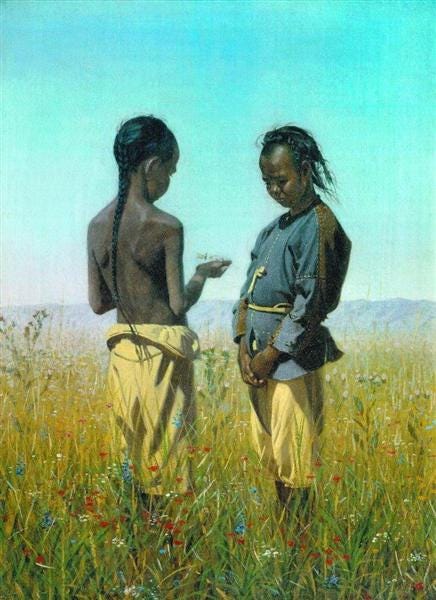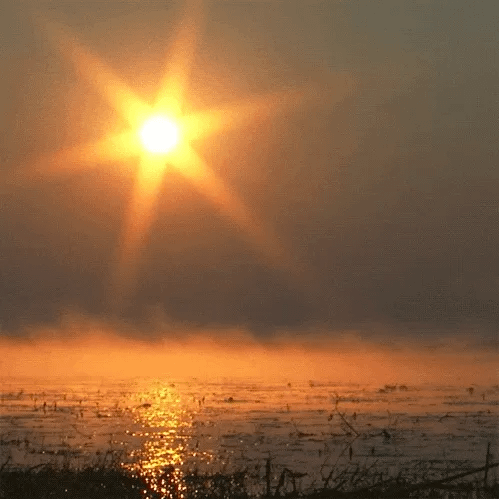The Children of the Solonov Tribe - Vasily Vereshchagin (1869 - 1870)
USAID and the Fragile Covenant of Hope
An Analysis:
---
Imagine a dawn breaking not over amber waves of grain, but over fields parched and cracking in the Sahel. A mother, her eyes holding the ancient weariness of generations, measures the last handful of millet against the cries of her children. Somewhere, a clinic, its walls thin as hope, awaits the delivery of antiretrovirals. A village elder, recalling the scourge of drought past, scans the horizon not for rain, but for the dust plume of a truck bearing seeds bred for resilience. This is the landscape where the United States Agency for International Development (USAID) quietly weaves its life-sustaining threads – not merely an agency, but a vast, intricate expression of America’s better angels, its soft power rendered tangible in grain sacks, vaccines, textbooks, and the quiet hum of restored wells.
—
I. The Multifaceted Mandate: More Than Aid, a Covenant
To speak of USAID is to speak of a covenant – imperfect, complex, yet profound – between the abundance of one nation and the desperate need of others. Its work resonates across the human spectrum:
1. Psychological
In the wake of typhoon or genocide, USAID-funded trauma counselors become weavers of shattered minds. They offer not just coping, but the fragile possibility of tomorrow where yesterday held only horror. Hope is the first nutrient for the human spirit, and USAID often delivers it.
2. Sociological
It builds the unseen scaffolding of societies: schools fostering girls’ potential, programs strengthening community governance, initiatives bridging ethnic divides. It understands that famine is not merely absent rain, but collapsed social contracts and failed markets.
3. Philosophical & Moral/Ethical
It grapples with the fundamental question: Do the fortunate have an obligation to the suffering? USAID embodies a practical answer – not just charity, but an investment in shared human dignity and the belief that preventable suffering is a moral affront. It walks the razor's edge between respecting sovereignty and asserting the imperative to save lives.
4. Historical
Born from the Marshall Plan's ashes and Kennedy’s idealism, USAID carries the weight of history – successes that rebuilt nations, failures where good intentions faltered against complexity or corruption. It is a testament to the long American experiment in engaging the world beyond its shores, not solely through force, but through sustenance.
5. Political & Geopolitical
This is the quiet engine of American soft power. When USAID vaccinates a child, digs a well, or supports a free press, it builds reservoirs of goodwill far deeper than any battleship. It counters malign influences, demonstrating that American engagement can mean life, not just leverage. It fosters stability, knowing that desperation is the tinderbox of extremism and mass migration.
6. Economic & Financial
It seeds markets, trains farmers in sustainable techniques, supports micro-enterprises (often led by women), and helps nations build resilient economies. Its disaster relief prevents localized shocks from cascading into regional economic collapse. Its funding often acts as critical catalyst, unlocking larger investments.
7. Scientific
From pioneering drought-resistant crops at CGIAR centers (massively funded by USAID) to developing rapid diagnostics for emerging pandemics, USAID is a vital patron of life-saving global science. Its reach brings cutting-edge solutions to the most remote clinics and fields.
8. Legal
It operates within intricate frameworks of international law, host-country regulations, and US statutes, navigating the delicate balance of conditionality, accountability, and humanitarian imperative. Its presence often strengthens local legal systems and human rights protections.
—
II. The Unraveling: A World Without the Loom
To dismantle USAID is not merely to close an office; it is to sever vital arteries in the body of global humanity. Picture the unraveling:
1. The Immediate Collapse
Programs cease mid-cycle. Antiretroviral shipments halt. Emergency food pipelines run dry. Vaccination campaigns stall. Seeds for the next planting season vanish from warehouses. Millions relying on acute humanitarian relief — especially in Africa — face immediate, catastrophic deprivation.
2. The Cascading Crises
Famine, not just hunger, erupts where safety nets vanish. Preventable diseases – measles, cholera, polio – surge as immunization collapses. HIV/AIDS deaths skyrocket. Maternal and infant mortality, painstakingly reduced, reclaim their grim toll. Fragile states, deprived of stabilization programs, tilt further into chaos, breeding grounds for violence and extremism. Mass migrations, fueled by desperation unseen in decades, swell uncontrollably.
3. The Vacuum and the Vultures
The sudden void would not remain empty. Authoritarian powers offering strings-attached aid, devoid of USAID's foundational commitment to human dignity and democratic principles, would rush in. Malign actors would exploit the chaos. Global health security would crumble, leaving the world vulnerable to the next pandemic. Scientific progress on poverty and disease would stall.
4. The Moral Dimming
The world would become perceptibly harsher, crueler. The tangible proof that powerful nations could act collectively to alleviate suffering would vanish. Cynicism would harden like concrete. The covenant of shared humanity would be fractured.
—
III. The Unnecessary Toll: Counting the Uncountable
Quantifying lives lost is a grim calculus, fraught with variables, yet the scale would be biblical. Consider:
1. Direct Health Interventions
Millions depend on USAID-funded HIV/AIDS treatment (PEPFAR alone supports over 20 million people). Discontinuation could mean millions of deaths within years. Similar collapse in malaria, TB, vaccination, and maternal health programs would add millions more annually. Conservative estimates suggest 5-10 million excess deaths within the first 2-3 years from health collapse alone.
2. Famine and Malnutrition
USAID is the world's largest provider of emergency food assistance. Its sudden withdrawal during current unprecedented global food insecurity could tip tens of millions into famine conditions. History shows famines kill swiftly and massively. Millions more, primarily children under five, would succumb to starvation and related diseases within the first year.
3. Conflict and Collapse
The destabilization effect would be incalculable but vast. Increased conflict deaths, displacement-related mortality, and the collapse of basic services in fragile states would claim countless lives indirectly attributable to the vacuum.
4. The Lost Future
Beyond immediate death, the toll includes generations stunted by malnutrition and denied education, lives lost to preventable diseases that would have been eradicated, and the extinguished potential of countless individuals who would have built better futures with USAID's support.
—
Conclusion
USAID is not without flaw. Its work is entangled with political realities, bureaucratic complexities, and the inherent difficulties of intervening in diverse, often fractured societies. Sometimes, the thread snags; sometimes, the pattern falters. Critics point to instances of inefficiency.
Yet, like the lone lamp burning in a vast, storm-swept night, its absence would reveal a darkness far more profound. It represents a conscious choice: that American power can manifest as a sack of fortified grain, a vaccinated child, a trained midwife, a field of resilient sorghum. It is soft power made manifest in the most visceral human terms – the power to sustain life itself.
To dismantle it would be an act of unimaginable myopia, a retreat from the shared burdens and possibilities of our interconnected world. The cost would be measured not just in dollars saved, but in millions of lives extinguished unnecessarily, in hope extinguished, in a world made immeasurably poorer, crueler, and more dangerous. The life-saving work of USAID remains an essential thread in the fragile, vital tapestry of our shared human existence – a testament to the enduring, if imperfect, belief that we are, indeed, our brothers' and sisters' keepers.
Its value lies in its irreplaceable presence against the encroaching dark.
MADA ~ Make America Democratic Again…
The Next Election:
Georgia, Virginia, and South Carolina - June 17, 2025







